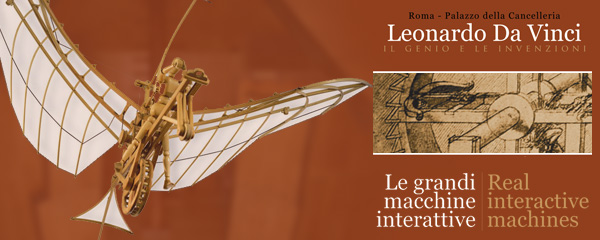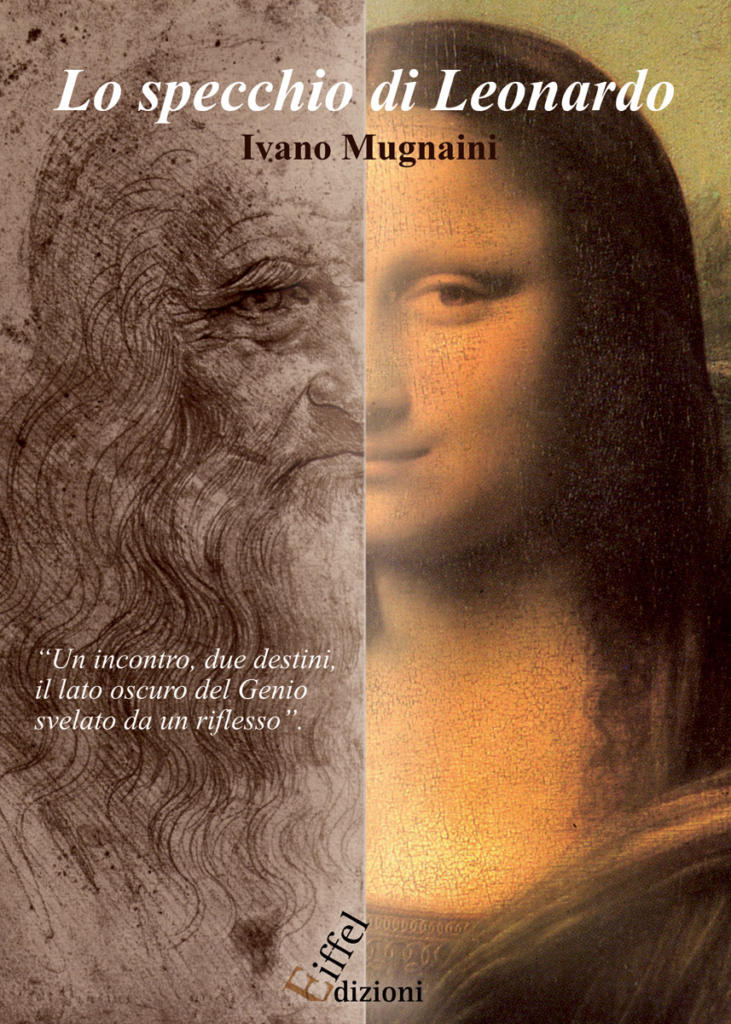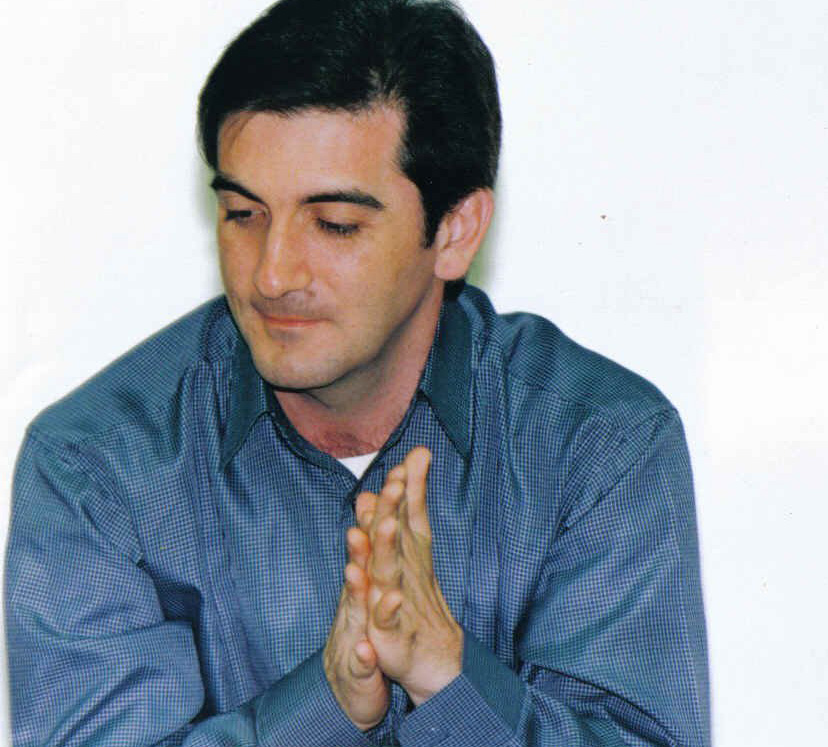 The figure of Leonardo da Vinci has always attracted the imagination not only for his creative genius but also for the mystery that surrounds his multifaceted personality able to charm us like his works.
The figure of Leonardo da Vinci has always attracted the imagination not only for his creative genius but also for the mystery that surrounds his multifaceted personality able to charm us like his works.
The cities that have paid tribute to him are many, from Vinci, the small town where you can find the birthplace of Anchiano, to Florence which houses the Museum of Leonardo behind the dome of the Cathedral (www.mostredileonardo.com). There is also the “Museum of Science and Technology Leonardo da Vinci” in Milan (www.museoscienza.org), the town where the Florentine genius has long lived and worked, and, not least, Rome, where his ingenious machines are celebrated in a Museum which is located at the Basilica of Santa Maria del Popolo (www.museodavinci.it) with a permanent exhibition, “Leonardo da Vinci – the genius and inventions”, hosted at the Palazzo della Cancelleria in which also converge a lot of promotional activities in schools (hwww.mostradileonardo.com/index.php). Among the many writers who have drawn inspiration from themes, events, realities and mysteries of Leonardo to write their novels, stands out for fame and worldwide attention, further enhanced by the well-known film, The Da Vinci Code by Dan Brown. But there are many other books that, in a more or less direct way, refer to Leonardo. Among the many possible examples, the beautiful Renaissance thriller of Bruno Vitiello, I delitti dell’anatomista, one of the protagonists of which is precisely Leonardo da Vinci, which combines a robust historical knowledge and an interesting narrative device.
Among the many writers who have drawn inspiration from themes, events, realities and mysteries of Leonardo to write their novels, stands out for fame and worldwide attention, further enhanced by the well-known film, The Da Vinci Code by Dan Brown. But there are many other books that, in a more or less direct way, refer to Leonardo. Among the many possible examples, the beautiful Renaissance thriller of Bruno Vitiello, I delitti dell’anatomista, one of the protagonists of which is precisely Leonardo da Vinci, which combines a robust historical knowledge and an interesting narrative device.
 To the number of these books that have a debt of inspiration to Leonardo, we can add now, with its many elements of originality and expressive power, the novel Lo specchio di Leonardo (Eiffel edizioni, 2016 http://www.ivanomugnaini.it/lo-specchio-di-leonardo-in-libreria-e-on-line/ ) of the writer and essayist Ivano Mugnaini, (www.ivanomugnaini.it ) author of the column “Viaggi al centro dell’autore” hosted by our magazine.
To the number of these books that have a debt of inspiration to Leonardo, we can add now, with its many elements of originality and expressive power, the novel Lo specchio di Leonardo (Eiffel edizioni, 2016 http://www.ivanomugnaini.it/lo-specchio-di-leonardo-in-libreria-e-on-line/ ) of the writer and essayist Ivano Mugnaini, (www.ivanomugnaini.it ) author of the column “Viaggi al centro dell’autore” hosted by our magazine.
The book, halfway between fictionalized biography and psychological investigation, renews the curiosity and mystery that surround the figure of Leonardo by opening a series of questions, sometimes puzzling. What is triggered in the mind of a genius when for absolutely fortuitous circumstances he stumbles in his double, that is, in what appears to be an exact copy of himself? And if the genius of Leonardo was actually that of his double?
On these questions develops the plot of the book that tells the path of evolution and transformation, complicity and rivalry which engage and are woven into a thousand knots and branches between two seemingly identical persons but with totally different personalities.
The result is a novel that draws on history with concrete and detailed events to stage a subtle and complex game of roles that will reveal a surprising ending.
A book with a brisk pace but to savor slowly, written with great skill and sensitivity, and characterized by a unique style.
Review Notes
Lo specchio di Leonardo (The Leonardo’s mirror) is an high-psychology exercise, goes deep to understand the thoughts that inhabit the mind of a genius. The author does a good job, with a remarkable biographical reconstruction, rebuilding and rework the human side of the character.
Not wanting to reveal any of suggestive literary images given us with this book I might define the work of Mugnaini as a biographical novel in full agreement with Giuseppe Panella that, among other things, defines it as a ” fictionalized biography sympathetic and hallucinating … “
Interview with Ivano Mugnaini
 We met the author, Tuscan like the protagonist of his book, at a literary presentation in Rome and we asked him a few questions about his recent work:
We met the author, Tuscan like the protagonist of his book, at a literary presentation in Rome and we asked him a few questions about his recent work:
Why did you choose to write a novel about Leonardo? What is the genesis of your book?
Leonardo da Vinci is an impressive figure, able to excel in almost every scientific and artistic field as well as in the collective imagination. He ends to impress and scare. His greatness is calling us to a challenge, a kind of tug of war, at a distance of course, but no less fierce. At the end we investigate in his life and mind to find a flaw, a weakness in his structure of man and thinker. We tend to give him a conceivable size, a fragility, something that makes him human.
I felt the urge to write about Leonardo, to look for his most hidden and mysterious side: that of a person subject to desires and obsessions, compulsions and frustrations. I underlined, using an invention of pure fantasy, the concrete aspects of Leonardo rather than his absolute geniality, unparalleled and almost impalpable.
What is the modernity of Leonardo?
Despite the enormous distances, chronological, individual and so on, you can find a common denominator between our modern neurotic weaknesses and aspirations and those of the character on which the book is focused. One wonders how a man was able to get to these levels. We can also detect, psychologically and socially, a parallel between our ambivalences and our compromise with the pressures, economic and moral, that even an absolute genius like Leonardo was forced to endure in his life. All this generates a universal contrast that can cross unchanged ages and times: on the one hand the vexations and the whims of power and on the other side the desire for authenticity and self-expression, in the sensual and mental dimension.
What specific features does your book possess that can make it interesting?
My novel is not proposing a new and shocking truth on the biography of Leonardo. That was not my intent. However, it contains a narrative mechanism that so far many readers have found interesting: it reveals an alter ego which Leonardo has to face, struggling first to recognize him as similar, then to get free from his alienating influence. What matters, for the plot and for the most authentic sense of the text, is the awareness that the protagonist takes on: the two phases, the fascination and the rejection of the other side of the self are not separated and distinct. They intersect and overlap in a meander of feelings and desires similar to those of any man and woman struggling for understanding what goes beyond the surface. The reflected image of my book is a double that at first Leonardo would use as a trick, a ruse to escape from a false and oppressive society. At first it is a kind of puppet equal to him for the physical aspect but with a very different mentality and way of seeing. Eventually it becomes an integral part of his path of knowledge. The same, after all, happens to each one of us, to our image reflected in the mirrors of our home and our world: the reality, physical and mental, is a picture or as an architectural work that we create and from which we are at the same time created. In a continuous, cruel and saving alternation of truth and lies, destruction and regeneration.

Igor W. Schiaroli is specialized in new media and technology. He has expertise in publishing and media sector. He is an independent journalist and a writer but primary a technologist and an economist too. He has passion and curiousity about science and travel.
He had major roles for Italian and International Media and Telecommunications companies.

Gianluca Cammi liked this on Facebook.
Matteo Franceschi liked this on Facebook.
Gionni Pucci liked this on Facebook.